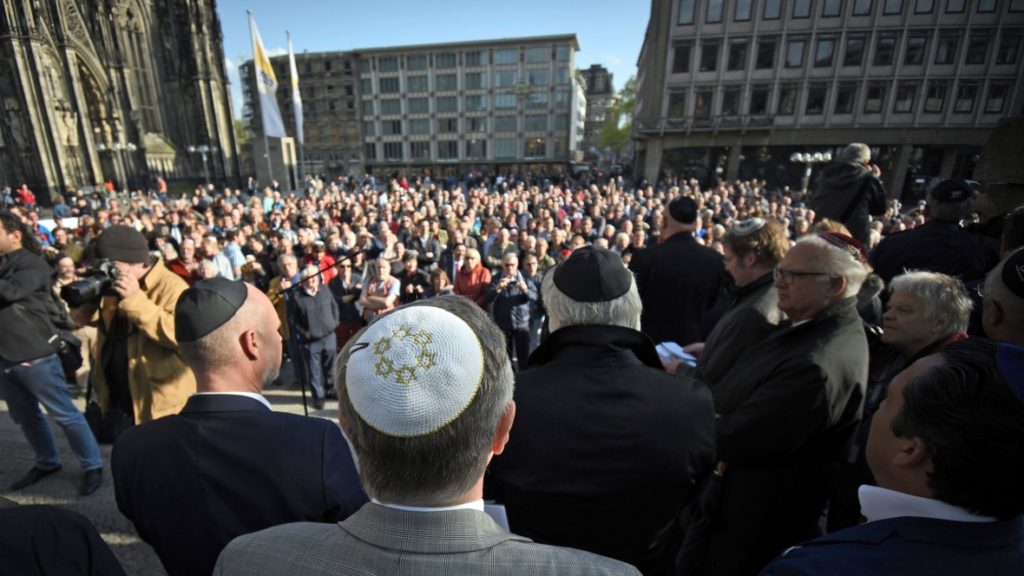Ahead of the international Remembrance Day for the victims of the Holocaust the European Commission published this week a special Eurobarometer on the perceptions of antisemitism in Europe. The day marks the anniversary of the liberation of the extermination camp Auschwitz-Birkenau by the Soviet Red Army on 27 January 1945. In the new survey, interviews were carried out last December face-to-face with 27,643 people in all 28 member states. Respondents were asked about their perception of antisemitism, knowledge of and educations about Jewish communities and the influence of the conflict in the Middle East on antisemitism.
Overall in EU, half of the respondents consider that antisemitism is a problem in their country. However, in eight EU Member States, a majority of respondents think so: Sweden (81%), France (72%), Germany (66%), the Netherlands (65%), the United Kingdom (62%), Italy (58%), Belgium (50%) and Austria (47%).
In six EU Member States, a majority think that antisemitism has increased in their country: Sweden (73%), Germany (61%), the Netherlands (55%), France (51%), Denmark (50% vs 34% “stayed the same”) and the United Kingdom (44% vs 33%).
Sweden, with a small and well-integrated Jewish population, stands out in the survey. Asked by The Brussels Times for a comment, Swedish Prime Minister Stefan Löfven, who just has formed a new minority government after parliamentary elections last September, declined to respond.
A socio-demographic analysis shows that respondents who say that antisemitism is a problem in their country are more likely to be Europeans with friends or acquaintances who are Jewish (64%) or Muslim (59%) or respondents themselves belonging to a minority.
At least half of Europeans think that six of nine manifestations of antisemitism are a problem in their country. Holocaust denial is considered the most pernicious problem, followed by antisemitism on the Internet, antisemitic graffiti or vandalism, and expressions of hostility and threats towards Jewish people in public places.
68% of Europeans feel that people in their country are not well informed about the history, customs and practices of people in their country. 42 % think that the Holocaust is not sufficiently taught in schools of their country. 54% believe that the conflicts in the Middle East have an influence on the way Jewish people are perceived in their country.
Perception gap
A previous survey published last December by EU Fundamental Rights Agency (FRA) showed that a majority of Jewish respondents across the EU experience antisemitism in different forms which hinders their ability to openly display their Jewish identity free from fears for their security.
“The findings make for a sobering read. They underscore that antisemitism remains pervasive across the EU – and has, in many ways, become disturbingly normalised,” said FRA Director Michael O´Flaherty. “Antisemitic hate speech, harassment and fear of being recognised as Jewish; these are some of the realities of being Jewish in the EU today. It appears to be getting worse.”
This survey was carried out among 16,300 people, which made it the largest survey ever among Jewish communities on antisemitism, covering 12 EU member states which are home to 95% of European Jewish people. The Commission found the fact that 85% of European Jews consider antisemitism to be the biggest social or political problem in their home country particularly worrying.
Frans Timmermans, First Vice-President of the Commission and S&D’s lead candidate in the forthcoming European Parliament elections, said then that, “The 20th century had many deceases. The only that remained incurable is antisemitism.”
“I wish, not only as a Commissioner but also as a father, that every young European knows the history of the Holocaust,” he said. “There is no Europe if Jews don’t feel safe in Europe. The Jewish community belongs to Europe no less as we, who aren’t Jewish, belong to Europe.”
“Let’s not be naïve. There is a new form of anti-Semitism that hides behind anti-Zionism. They hide their true motives. At the same time, it’s nonsense to claim that criticism of the actions of the Israeli government is anti-Semitism. I don’t accept that.”
He also criticised some EU member states for their identity politics. “If you choose Identity policy, it will sooner or later refer to minorities and the first minority to be hit is the Jews.”
Other figures in FRA’s survey showed that antisemitism has an impact on the daily lives of European Jews throughout the EU: 28% of respondents have been harassed at least once in the past year, with those being visibly Jewish most affected. 34% avoid visiting Jewish events or sites because they do not feel safe. 38% have considered emigrating because they did not feel safe as Jews in Europe.
Overall, awareness of antisemitism is lower among the general population. Is there a perception gap? “Awareness is highest in countries with a significant Jewish population or where the Jewish community is attacked in the media,” a Commission spokesperson replied.
Antisemitism is not always seen as a problem or visible enough by the general population. “In Sweden and France, antisemitism has been very visible in media and both countries are struggling with antisemitism stemming from different sources (left-wing, right-wing, religious extremists).”
M. Apelblat
The Brussels Times

